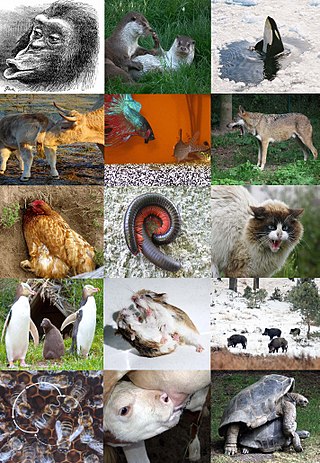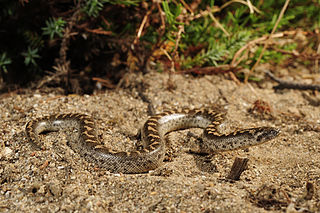Related Research Articles

Ethology is the scientific study of animal behavior, usually with a focus on behaviour under natural conditions, and viewing behaviour as an evolutionarily adaptive trait. Behaviourism as a term also describes the scientific and objective study of animal behavior, usually referring to measured responses to stimuli or to trained behavioral responses in a laboratory context, without a particular emphasis on evolutionary adaptivity. Throughout history, different naturalists have studied aspects of animal behaviour. Ethology has its scientific roots in the work of Charles Darwin and of American and German ornithologists of the late 19th and early 20th century, including Charles O. Whitman, Oskar Heinroth, and Wallace Craig. The modern discipline of ethology is generally considered to have begun during the 1930s with the work of Dutch biologist Nikolaas Tinbergen and Austrian biologists Konrad Lorenz and Karl von Frisch, the three recipients of the 1973 Nobel Prize in Physiology or Medicine. Ethology combines laboratory and field science, with a strong relation to some other disciplines such as neuroanatomy, ecology, and evolutionary biology. Ethologists typically show interest in a behavioral process rather than in a particular animal group, and often study one type of behavior, such as aggression, in a number of unrelated species.

Evolutionary psychology is a theoretical approach in psychology that examines cognition and behavior from a modern evolutionary perspective. It seeks to identify human psychological adaptations with regards to the ancestral problems they evolved to solve. In this framework, psychological traits and mechanisms are either functional products of natural and sexual selection or non-adaptive by-products of other adaptive traits.

Niche construction is the process by which an organism alters its own local environment. These alterations can be a physical change to the organism’s environment or encompass when an organism actively moves from one habitat to another to experience a different environment. Examples of niche construction include the building of nests and burrows by animals, and the creation of shade, influencing of wind speed, and alternation of nutrient cycling by plants. Although these alterations are often beneficial to the constructor, they are not always.

Sir Paul Patrick Gordon Bateson, was an English biologist with interests in ethology and phenotypic plasticity. Bateson was a professor at the University of Cambridge and served as president of the Zoological Society of London from 2004 to 2014.

David Michael Buss is an American evolutionary psychologist at the University of Texas at Austin, researching human sex differences in mate selection. He is considered one of the founders of evolutionary psychology.

A psychological adaptation is a functional, cognitive or behavioral trait that benefits an organism in its environment. Psychological adaptations fall under the scope of evolved psychological mechanisms (EPMs), however, EPMs refer to a less restricted set. Psychological adaptations include only the functional traits that increase the fitness of an organism, while EPMs refer to any psychological mechanism that developed through the processes of evolution. These additional EPMs are the by-product traits of a species’ evolutionary development, as well as the vestigial traits that no longer benefit the species’ fitness. It can be difficult to tell whether a trait is vestigial or not, so some literature is more lenient and refers to vestigial traits as adaptations, even though they may no longer have adaptive functionality. For example, xenophobic attitudes and behaviors, some have claimed, appear to have certain EPM influences relating to disease aversion, however, in many environments these behaviors will have a detrimental effect on a person's fitness. The principles of psychological adaptation rely on Darwin's theory of evolution and are important to the fields of evolutionary psychology, biology, and cognitive science.

Randolph M. Nesse is an American physician, scientist and author who is notable for his role as a founder of the field of evolutionary medicine and evolutionary psychiatry. He is professor of life sciences and ASU Foundation Professor at Arizona State University, where he became the Founding Director of the Center for Evolution and Medicine in 2014. He was previously a professor of psychiatry, professor of psychology and research professor at the University of Michigan where he led the Evolution and Human Adaptation Program and helped to establish one of the world's first anxiety disorders clinics and conducted research on neuroendocrine responses to fear.
Dual inheritance theory (DIT), also known as gene–culture coevolution or biocultural evolution, was developed in the 1960s through early 1980s to explain how human behavior is a product of two different and interacting evolutionary processes: genetic evolution and cultural evolution. Genes and culture continually interact in a feedback loop, changes in genes can lead to changes in culture which can then influence genetic selection, and vice versa. One of the theory's central claims is that culture evolves partly through a Darwinian selection process, which dual inheritance theorists often describe by analogy to genetic evolution.

Evolutionary developmental psychology (EDP) is a research paradigm that applies the basic principles of evolution by natural selection, to understand the development of human behavior and cognition. It involves the study of both the genetic and environmental mechanisms that underlie the development of social and cognitive competencies, as well as the epigenetic processes that adapt these competencies to local conditions.
Cognitive science of religion is the study of religious thought, theory, and behavior from the perspective of the cognitive and evolutionary sciences. Scholars in this field seek to explain how human minds acquire, generate, and transmit religious thoughts, practices, and schemas by means of ordinary cognitive capacities.
Anne C. Campbell was a British academic and author specializing in evolutionary psychology. Her research was largely concerned with sex differences in aggression between men and women. She was professor of psychology at Durham University.
Joseph Carroll is a scholar in the field of literature and evolution. He received his PhD in Comparative Literature from the University of California, Berkeley and is now Curators’ Distinguished Professor Emeritus at the University of Missouri–St. Louis.
The Sociobiology Study Group was an academic organization formed to specifically counter sociobiological explanations of human behavior, particularly those expounded by the Harvard entomologist E. O. Wilson in Sociobiology: The New Synthesis (1975). The group formed in Boston, Massachusetts and consisted of both professors and students, predominantly left-wing and Marxist.

Katharine Louisa Russell, Viscountess Amberley, often referred to as Kate, was a British suffragist and an early advocate of birth control in the United Kingdom. She was the mother of the philosopher Bertrand Russell.
Todd Kennedy Shackelford is an American psychologist and professor at Oakland University. He is best known for his work in evolutionary psychology. He is the editor in chief of the academic journals Evolutionary Psychology and Evolutionary Psychological Science. He is a fellow of the American Psychological Association and the Association for Psychological Science.
Female intrasexual competition is competition between women over a potential mate. Such competition might include self-promotion, derogation of other women, and direct and indirect aggression toward other women. Factors that influence female intrasexual competition include the genetic quality of available mates, hormone levels, and interpersonal dynamics.
Evolutionary psychology has traditionally focused on individual-level behaviors, determined by species-typical psychological adaptations. Considerable work, though, has been done on how these adaptations shape and, ultimately govern, culture. Tooby and Cosmides (1989) argued that the mind consists of many domain-specific psychological adaptations, some of which may constrain what cultural material is learned or taught. As opposed to a domain-general cultural acquisition program, where an individual passively receives culturally-transmitted material from the group, Tooby and Cosmides (1989), among others, argue that: "the psyche evolved to generate adaptive rather than repetitive behavior, and hence critically analyzes the behavior of those surrounding it in highly structured and patterned ways, to be used as a rich source of information out of which to construct a 'private culture' or individually tailored adaptive system; in consequence, this system may or may not mirror the behavior of others in any given respect.".
Cultural evolution is an evolutionary theory of social change. It follows from the definition of culture as "information capable of affecting individuals' behavior that they acquire from other members of their species through teaching, imitation and other forms of social transmission". Cultural evolution is the change of this information over time.
Ruth Mace FBA is a British anthropologist, biologist, and academic. She specialises in the evolutionary ecology of human demography and life history, and phylogenetic approaches to culture and language evolution. Since 2004, she has been Professor of Evolutionary Anthropology at University College London.
Kevin Neville Lala is an English evolutionary biologist who is Professor of Behavioural and Evolutionary Biology at the University of St Andrews in Scotland. Educated at the University of Southampton and University College London, he was a Human Frontier Science Program fellow at the University of California, Berkeley before joining the University of St Andrews in 2002. He is one of the co-founders of niche construction theory and a prominent advocate of the extended evolutionary synthesis. He is a fellow of the Royal Society of Edinburgh and the Society of Biology. He has also received a European Research Council Advanced Grant, a Royal Society Wolfson Research Merit Award, and a John Templeton Foundation grant. He was the president of the European Human Behaviour and Evolution Association from 2007 to 2010 and a former president of the Cultural Evolution Society. Lala is currently an external faculty of the Konrad Lorenz Institute for Evolution and Cognition Research.
References
- ↑ "Gillian R Brown". Google Scholar Citations . Retrieved 30 January 2019.
- ↑ Slama, Mark (1 June 2004). "Sense and Nonsense: Evolutionary Perspectives on Human Behaviour". Psychology & Marketing. 21 (6): 481–485. doi:10.1002/mar.20015. ISSN 1520-6793.
- ↑ Fleischman, Diana S. (March 2012). "A review of Kevin N. Laland and Gillian R. Brown (2011)". Journal of Evolutionary Psychology. 10 (1): 43–46. doi: 10.1556/jep.10.2012.1.3 .
- ↑ Parlar, Ugur (1 September 2013). "Kevin N. Laland and Gillian R. Brown: Sense and Nonsense: Evolutionary Perspectives on Human Behaviour, Second Edition". Science & Education. 22 (9): 2337–2340. Bibcode:2013Sc&Ed..22.2337P. doi:10.1007/s11191-013-9602-9. ISSN 1573-1901. S2CID 141143572.
- ↑ "Wellcome Grants Awarded (2005-2019)". wellcome.ac.uk. Retrieved 24 June 2020.